
Basecamp is a popular project management tool for startups and small businesses. In recent years, many new alternatives to Basecamp have emerged.
These alternatives offer similar features with fewer limitations and lower prices. They also provide additional functionality that makes them even more useful.
Find out more about these Basecamp alternatives and the flexibility and customization options they provide that make them an effective project management solution.
What is Basecamp?
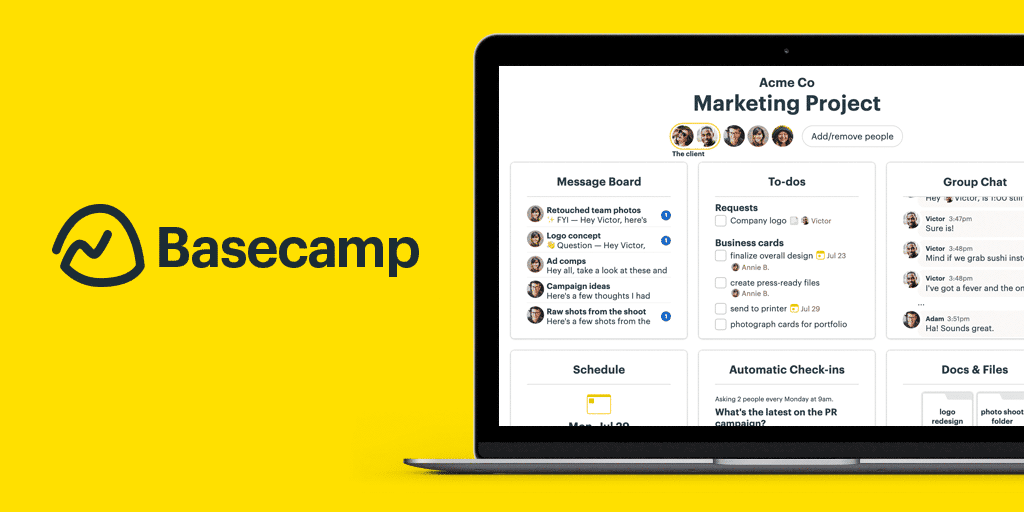
A powerful project management tool, Basecamp provides a simplified, organized, and easy-to-use platform for businesses and individuals.
Basecamp is a great tool for managing projects because it helps teams collaborate effectively. It provides features such as task lists, file sharing, chat rooms, and issue tracking. Basecamp allows users to collaborate through shared documents and email.
If you’re looking for a simple solution to help you organize projects, Basecamp is a great option.
Even though Basecamp is one of the most popular project management apps available today, there are alternatives out there that may be better suited to your needs.
Here’s a quick summary of the best Basecamp alternatives in 2025:
- For task management, real-time collaboration, and branding—FuseBase
- For organizing your ideas and projects—Trello
- For collaborating with your team—ClickUp
- For connecting work across different departments—Asana
- For flexibility in setting up workspaces—Monday.com
- For large teams—Teamwork
- For creating custom workflows—ProofHub
- For easier project management and faster communication—Podio
- For creative professionals—Honeybook
- For managing complex cross-functional workflows—Wrike
5 Reasons Why You May Want a Basecamp Alternative
If you have considered Basecamp for project management and team collaboration, the good news is there are many alternatives available today.
Here are several reasons to consider an alternative.
| Cost effectiveness | Even though offers a free trial, at $15/user per month, Basecamp offers a competitive price if you’re a solo user. However, for small businesses with multiple users, that can quickly add to hundreds or thousands of dollars every year. |
| Limited integrations | Basecamp only integrates with selected third-party apps. This limits its usefulness for larger companies who want to integrate their own systems into Basecamp. |
| Lack of customization options | The lack of customization options means you cannot customize Basecamp to suit your specific business needs. If you’re looking for something that works specifically for your company, then you’ll likely find it difficult to do so with Basecamp. |
| No time tracking | Since time tracking is an essential part of project management, not having it at a task level makes Basecamp an unreliable tool for tracking tasks. |
| Lack of advanced features | Using Basecamp, you will quickly discover it may not offer the features you need. Especially for complex projects. It will also be hard to deal with many projects at once. Limited task management capabilities, no automation, and no reporting functionality make it harder for larger agencies |
With many competitors in the market today, you have many options for finding a great alternative to Basecamp.
What to Consider When Searching for a Basecamp Alternative
There are many alternatives to Basecamp, but not all of them are created equal. Some of these software programs are free, while others require a monthly subscription.
Some are easy to set up and use quickly, while other software, like Basecamp, require technical expertise. There are also differences in their capabilities and features compared to Basecamp. Some are designed specifically for teams, while others are meant for individuals.
Here are things to consider when searching for a Basecamp alternative.
1. Do you need a program that offers features beyond project management?
Many project management systems like Basecamp include additional features, such as task tracking, file sharing, client portals, and chat systems. These features can help streamline workflows and improve collaboration among team members and clients.
2. How much time will you spend setting up the system?
Setting up a new project management system that has a similar level of complexity to Basecamp takes time. The process involves installing software on each computer, configuring settings, and learning how to navigate the interface. You will also need to consider the training required to get user up to speed with using the system.
3. What’s your budget?
You don’t need to pay top dollar for a project management system. Many of the top Basecamp alternatives cost less than $50 per month. However, if you plan on using this software for a long time, you might want to invest in a better version of Basecamp.
4. Will you need support?
If you decide to go with a replacement app to Basecamp, you should know what kind of support you will receive. Most companies offer 24/7 phone support, email support, and online forums. You can also expect to receive updates and bug fixes through the software update feature.
Despite its popularity, Basecamp isn’t necessarily the best option for every business. There are plenty of Basecamp alternatives out there that might be better suited to your specific needs.
Best 10 Alternatives to Basecamp
Here are ten top Basecamp competitors in 2025 that you may want to consider for your project management, productivity, and collaboration needs.
1. FuseBase—compare
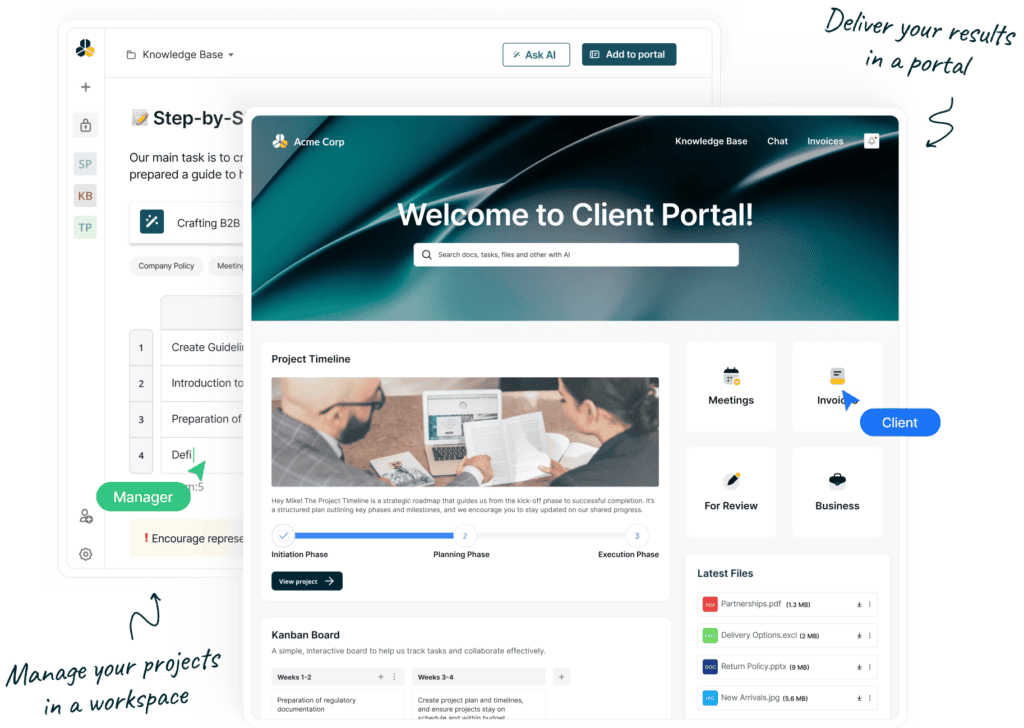
More than just a project management tool, FuseBase offers a suite of features to support your collaboration needs, beyond what Basecamp does.
You can use FuseBase for project management, real-time communication via chats and comments, content organization, file uploading and sharing, and a wide range of integrations. In addition, it offers customizable portals for working with your clients.
Here are a few of the key features of FuseBase.
- White label. This allows you to set up your custom domain and fully customize workspaces and portals with your brand assets.
- Document creation. Complement project management capabilities with interactive and multi-format information in super documents. You can add tables, buttons, and toggles to better organize your information.
- Powerful editor with advanced formatting. Add video and audio files, images, text, PDF documents, and file attachments. Create columns and arrange tables so you can transform your pages into articles, how-to guides, and landing pages.
- Customizable client portals. Centralize all your client communication to provide a better service and superior user experience. Collaborate with your clients in branded portals where they can monitor project progress, upload files, manage tasks, and more.
- Hundreds of ready-to-use templates. Save time and effort by using templates already available. Whether you’re in operations, sales, or marketing, and want to create product or design briefs, there are templates to help you get started much faster.
- Task and project management features. Stay on track using the built-in tasks features. Assign team members, define labels, track time, and set due dates to better manage your tasks in Kanban boards or task lists.
- Workflow Automation and AI capabilities. Save time on content creation and reduce routine admin tasks
- System of folders and subfolders. You can create nested folders and sub-folders to better structure your information and content within your workspaces.
Cons
- Inability to organize folders manually.
- Search works only within one workspace
Pricing
- Free plan, which you can use for creating 1 Client Portal, 1 Workspace, AI Test Drive with a total of 20 prompts and 20 free runs on Workflow automation.
- Solo: $32 per month for personal use – 1 client portal and 3 workspaces, 1 client, unlimited content creation, and real-time chat.
- Essentials: $82 per month for small teams – 5 members, 10 portals, 100 clients, efficient PM tools, and workflow automation.
- Advanced: $332 per month for larger teams – 50 members, 50 portals/150 workspaces, 1000 clients, and white-label.
- Unlimited: custom pricing.
FuseBase is a solid alternative to Basecamp because you can do so much more than manage projects or tasks.
Find out more to get started with a free account today
2. Trello
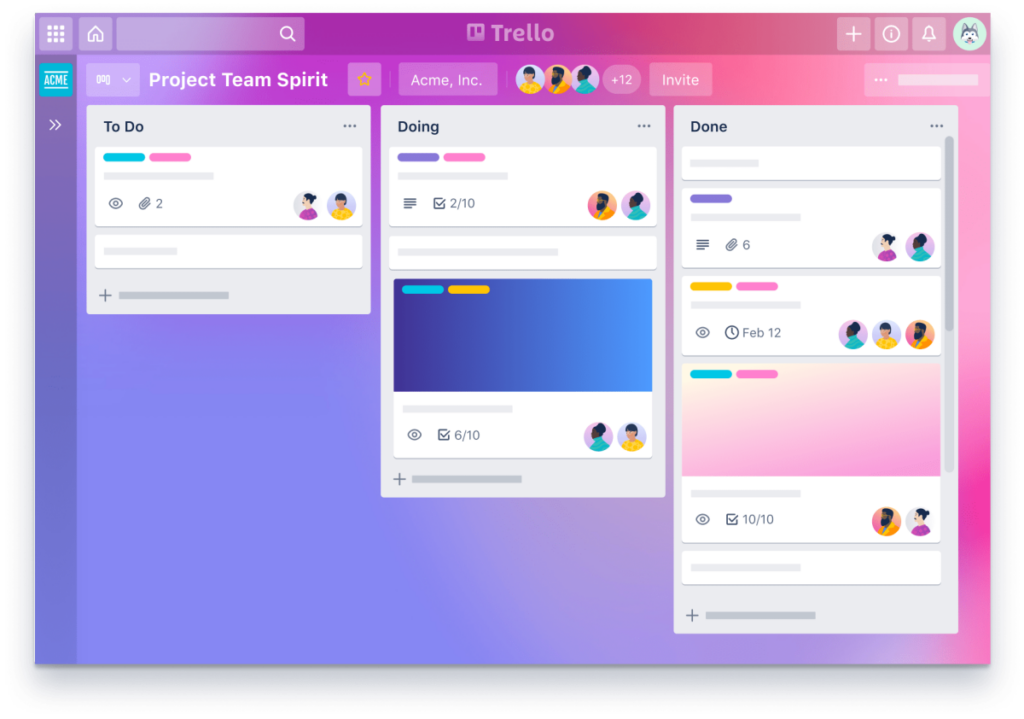
One of the more popular free project management apps, Trello, has been around for over a decade. It was originally created as a simple way to share boards with friends and family.
Over the years, Trello has evolved into a powerful project management platform that allows users to easily organize their ideas and projects.
Trello provides many features such as:
- Card sorting.
- Time tracking.
- Gantt chart view.
- Searchable cards.
- Task management.
- Board organization.
- Easily add comments to cards.
- Real-time collaboration and updates.
Cons
- Limited integrations.
- Lacks advanced project management features.
- Limited customization options.
- Cannot aggregate boards.
- Limited note-taking capabilities.
- Does not allow multiple team members to edit the same card at once.
Pricing
- Basic Plan – Free. This gives you a limited number of boards per workspace and a 10MB file upload limit.
- Standard Plan – $5 / month per user when billed annually. This provides additional features, such as unlimited boards, advanced checklists, and custom fields.
- Premium Plan – $10 / month per user when billed annually. This is best suited for teams and offers features such as multiple workspace views, admin and security features, and a lot more.
3. ClickUp

A similar tool to Trello, ClickUp is a cloud-based project management tool that lets you collaborate with your team using real-time communication tools like Slack and Zoom. It’s one of the most flexible project management solutions available and is a great Basecamp alternative.
It comes with a variety of features, such as:
- File sharing.
- Chat rooms.
- Document editing.
- Markdown support.
- Video conferencing.
- Workflow automation.
- Task management, including task dependencies, to-do lists, and reminders.
Cons
- Not suitable for large teams.
- Limited integrations.
- Lacks advanced project planning features.
Pricing
- Free Forever. This gives you unlimited tasks and 100MB of storage.
- Unlimited Plan for $7 / month per user. This gives you unlimited storage, unlimited integrations, and unlimited dashboards.
- Business Plan for $12 / month per user. This gives you everything in the Unlimited Plan, along with unlimited teams, custom exporting, advanced sharing and automation features, and advanced dashboard features.
4. Asana
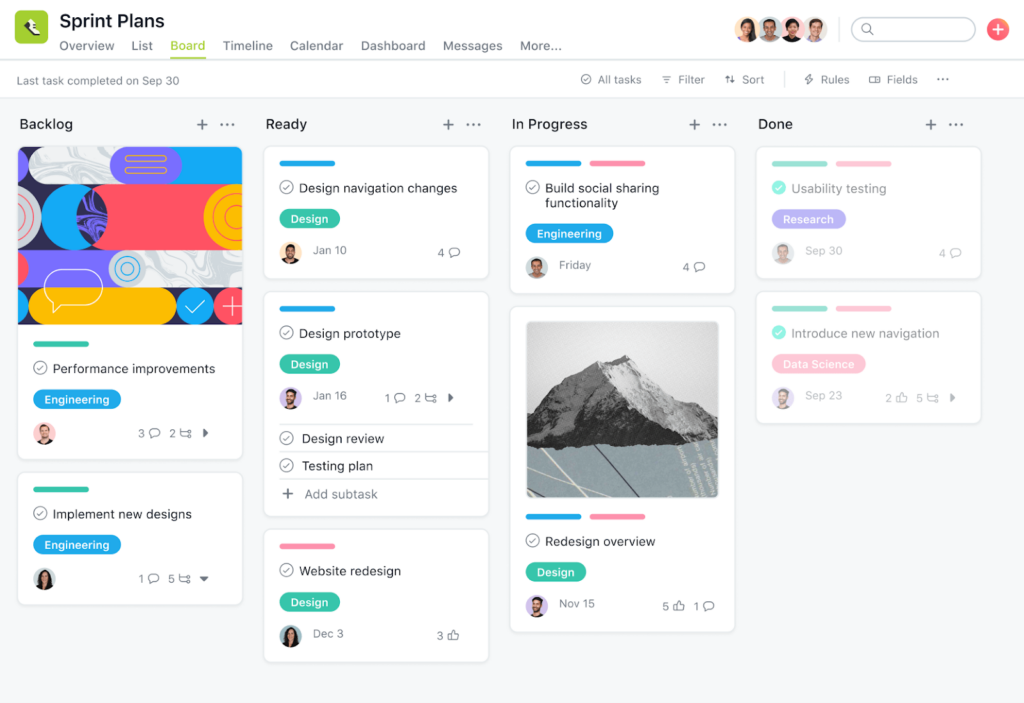
One of the most popular project management software for teams and freelancers, Asana, is used by companies like Airbnb, NASA, and Spotify.
It’s an all-in-one project management tool similar to Basecamp that helps you track tasks, collaborate with teammates, and stay organized.
Some of its key features include:
- Invoicing.
- File sharing.
- Dashboards.
- Work management.
- Team Communication.
- Collaboration with team members.
Asana integrates with Gmail, Dropbox, Box, OneDrive, Slack, Salesforce, and Zapier. It also supports third-party integrations, such as GitHub, Jira, and Zendesk. You can use Asana on desktop, mobile, and web browsers.
Cons
- High priced because you need to have a subscription to get access to advanced features.
- Unable to assign tasks to multiple users.
- Limited mobile app functionality.
Pricing
- Personal: Free, with limited features.
- Starter: $10.99 / month per user for advanced search, timeline view, forms, etc
- Advanced: $24.99 / month per user for time tracking, advanced reporting, etc
- Enterprise: Custom pricing based on your specific requirements.
5. Monday.com
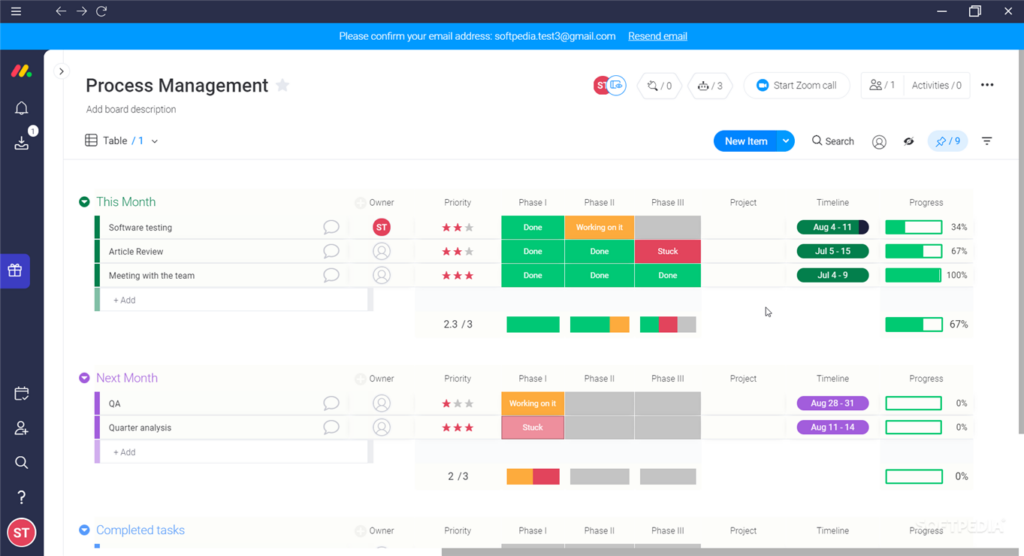
Another solid alternative to Basecamp, Monday.com, is a simple yet flexible project management tool.
It has been designed specifically for teams and freelancers who are looking for a quick way to organize their projects. You can create projects, add tasks, set deadlines, and share files easily.
Monday.com provides a number of features such as:
- Reporting.
- File sharing.
- Automations.
- Collaboration.
- Time tracking.
- Resource management.
Cons
- Limited to only three boards on their free plan.
- Basic plan requires you to sign up for three seats, so if you are a solo user, you will pay for two extra seats you do not need.
Pricing
- Free: Free for up to two seats, with three boards and unlimited docs.
- Basic: $9 / month per user, which offers unlimited items and 5 GB file storage.
- Standard: $12 / month per user, which offers timeline and Gantt views, and automations.
- Pro: $19 / month per user when billed annually, which includes private boards and docs, time tracking, and custom dashboards.
6. Teamwork
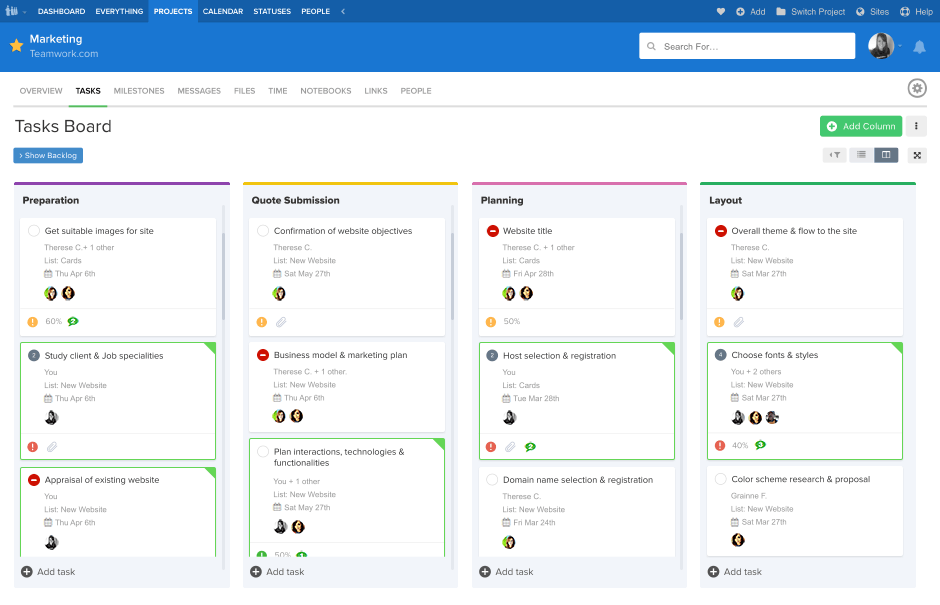
An advanced version of Basecamp, Teamwork, is ideal for large teams. It allows you to create and track projects, assign tasks, and track progress using different channels, including email, instant messaging, and social media.
Teamwork offers a variety of features that include:
- Chat room.
- Mobile apps.
- Email integration.
- Task management.
- Integration with popular apps, including HubSpot, Slack, Zapier, Google Drive, Office 365, and more.
Cons
- Requires a paid account to be able to view certain information.
- Lacks some of the core features found in other project management solutions.
Pricing
- Deliver: $10.99 / month per user, which offers such as, create and process intake forms, billing and invoicing.
- Grow: $19.99 / month per user, which offers reporting features and client level teams.
- Scale: $54.99 / month per user, which offers unlimited retainer management and resource scheduler
- Enterprise: Custom pricing, which offers all their advanced features.
7. ProofHub
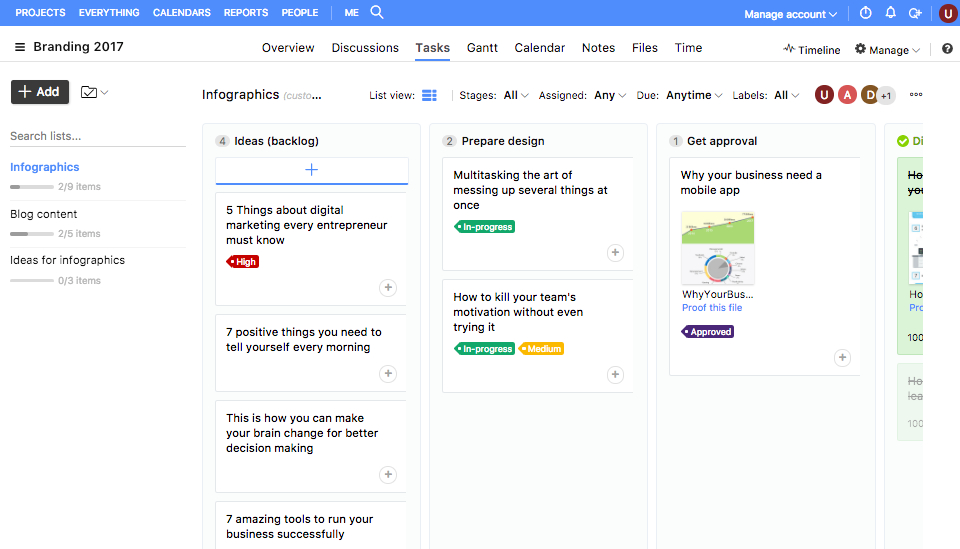
Another one of Basecamp’s competitors, ProofHub, allows solo users and teams to manage their work by providing a secure workspace where they can collaborate with clients and colleagues.
ProofHub offers a wide range of tools that help you manage your workflow efficiently. These include:
- Custom roles.
- Assigning tasks
- Custom workflows.
- Organizing projects.
- Flat pricing and not a per-user fee.
- Prioritizing tasks with deadlines Kanban boards and Gantt chart.
Cons
- Not price competitive, with only two plans offered.
- Limited integrations on their Essentials plan.
- Not ideal for large teams.
Pricing
- Essentials Plan: $45 / month billed annually for 40 projects, unlimited users, and 15GB storage
- Ultimate Control: $89 / month billed annually for unlimited projects, 100GB storage, and advanced features
8. Podio

With a focus on easier project management and faster communication, Podio is another adequate Basecamp alternative that enables you to bring all your content, processes, and conversations in one place.
With Podio, it’s quick to set up and have full control for how you want to manage your activities.
The features Podio offers include:
- CRM.
- Calendar set up
- Integrated chat.
- Unlimited storage.
- Automated workflows.
- Web and mobile apps.
- Customizable personal dashboards
Cons
- Unattractive interface.
- Slow development of new features.
- Poor communication and support.
- Regular downtime.
Pricing
- Free plan for five users, task management, and workspaces.
- Plus Plan: $11.20 / month per user billed annually for unlimited client users and automated workflows.
- Premium Plan: $19.20 / month per user billed annually for visual reports and advanced automation
9. Honeybook

If you’re a creative professional or a small business owner looking for a tool that handles everything from project management to client communication and payments, HoneyBook is a fantastic solution. Honeybook offers more customization options alongside a toolkit of client-facing features and automated workflows for better engagement.
Honeybook offers a variety of features that include:
- Scheduling
- Project tracking
- Task management
- Invoicing & payments
- Creating custom, interactive files
- iOS mobile app and an Android app
Cons
- Basic branding only
- Lack of integrations and customization options
- Not a lot of project management features
Pricing
- Starter: $16 / month per user billed annually for unlimited clients and projects, proposals and contracts, invoices and payments
- Essentials: $32 / month per user billed annually for automations, scheduler, and other useful features, including an expense management kit.
- Premium: $66 / month per user billed annually for advanced reports, unlimited team seats, and onboarding specialists.
10. Wrike
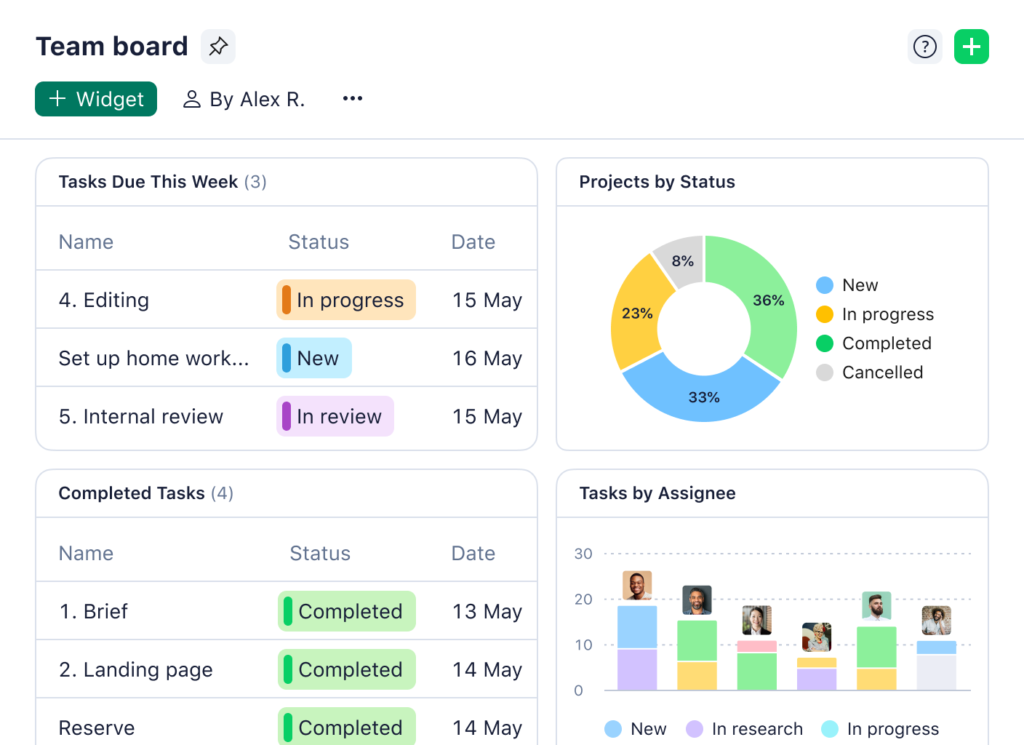
And our list of Basecamp alternatives ends with Wrike. It’s a project management and team collaboration software that allows marketing, business, and product operations teams to accelerate approvals and collaborate seamlessly with other teams.Its capabilities also include customizable features, task management, and real-time updates.
Wrike’s core features are:
- Time tracking
- Calendar View
- Real-time reports
- Dynamic request forms
- More than 400+ integrations
- Web, desktop, and mobile apps
Cons:
- A long learning curve
- Configuration of the custom fields is very limited
- Does not look modern for users looking for attractive platforms.
Pricing:
- Free: for teams getting started
- Team: $10 / month per user for 1 shared space, integrations, and 2 GB storage per user
- Business: $24.80 / month per user for project blueprints, unlimited shared spaces, and 5 GB storage per user
- Enterprise: Custom pricing for password policies, custom access roles, admin permissions, and 10 GB storage per user
Get Started with the Best Basecamp Alternative Now
With many products similar to Basecamp available today, software like FuseBase is the best fit if you’re searching for a Basecamp alternative.
Today, to maximize productivity and effectiveness, you need apps that go beyond project management. FuseBase is the best collaboration tool for your business because it gives you many more options and flexibility than Basecamp.
DISCLAIMER
Parties other than FuseBase may provide products, services, recommendations, or views on FuseBase site (“Third Party Materials”). FuseBase is not responsible for examining or evaluating such Third Party Materials, and does not provide any warranties relating to the Third Party Materials. Links to such Third Party Materials are for your convenience and do not constitute an endorsement of such Third Party Materials.
Found it useful? Share the article with your community
Subscribe to our blog!
Get weekly tips and insights on how to grow your business